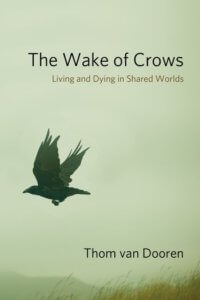
Fleck Prize 2021: Thom Van Dooren
The Society for Social Studies of Science (4S) has awarded the Ludwik Fleck Prize of 2021 to Thom van Dooren for his book The Wake of Crows: Living and Dying in Shared Worlds (Columbia University Press 2019).
The Fleck Prize, first awarded in 1992, recognizes an outstanding book in the area of Science and Technology Studies (STS). For the 2021 prize, the Committee reviewed more than 50 books and evaluated them on their scholarly quality and their exemplary contribution to the field. The Wake of Crows exemplifies the potential of STS to bring together knowledge production at the cusp of the natural and social sciences and humanities, thus giving form to a global scholarly conversation.
The Wake of Crows is a playful invitation for reimagining the possibilities of human and nonhumans’ shared lives on earth. It is a call for learning to live (and die) well with each other in rapidly changing worlds. Five captivating stories of crows—and their humans—take us across different sites to offer a critical reflection on the multispecies ethics of our entangled worlds. The book weaves stories of crows and their encounters with humans in Brisbane, Hawaii, the Netherlands, Mojave Desert (USA), and the Pacific Island of Rota (Mariana Islands) taking seriously the ways in which humans’ very existence on the earth are so fundamentally interlinked with nonhuman living and non-living beings—perhaps never more pertinent than in the current times. Sharing, Van Dooren explains, is holding in common and dividing up. The tension of building our shared worlds runs through the book in vivid examples of the inventiveness of crows along their endangered existence. Van Dooren’s attentive gaze to the complex realities of human-nonhuman relationships powerfully elucidates the multiplicities of our modes of life while carefully advocating for situated collective flourishings exemplified in the particularities of each of his research sites.
Five key concepts along with rich empirical stories frame Van Dooren’s multispecies ethics: community, inheritance, hospitality, recognition, and hope. Each concept builds with Van Dooren’s conversation in and through specific places.

In Hawaii the tensions between conservationists, hunters, and local people (many wearing more than one hat) make evident familiar concerns of extinction and colonization seen elsewhere in the world.
Hoek van Holland, a small coastal town in the west of the Netherlands, exemplifies the interconnectedness of our world through the example of invasive crows traveling in shipping containers. The concept of hospitality here, in conversation with Derrida’s work, renders visible the implicit power of some individuals to claim the right to decide who comes and who goes (p. 109).
The encounter of crows, humans, and high-tech tortoises in the Mojave Desert exemplify an ongoing search for living better with each other. In studying how technology may be appropriated to deter crows from eating desert tortoises, the concept of recognition illustrates possibilities for a more diplomatic coexistence.
Finally, the encounters of crows, Chamorro people, farming frontiers, and colonial governance infrastructures in the Island of Rota illuminate the entangled difficulties of economic progress in an age of ecological upheaval. Hope grows and expands as we actively care for the future, writes Van Dooren, It is an iterative, cumulative, self-reinforcing work, an effort to do whatever one can—within the context of the many, always unequal constraints that shape our possibilities—to nurture a better future into being (p. 209).
The Wake of Crows is a beautifully written book both of and for a time characterised by loss and death. Thom Van Dooren’s practice of the wake for living and dying worlds is an opportunity for creative, reparative, collective world making. Indeed, a wake is also an opportunity to celebrate a life and to move forward well with those who remain (p. 7).
For its reframing imaginaries of what life worlds can be, the Society for Social Studies of Science is honoured to award The Wake of Crows the Ludwik Fleck Prize of 2021.
2021 Fleck Prize Committee: Lesley Green (chair), Ana Viseu, Maka Suarez, Duygu Kasdogan
Acceptance Statement
It is an honour to be awarded the 2021 Ludwik Fleck Prize. The Wake of Crows, like so much of my other work, has been profoundly influenced by many of the other books that have previously received this distinction. It is truly humbling to think that the crows might now be keeping such company.
I’d like to thank the many colleagues and friends, within and beyond the vibrant 4S community, who provided invaluable support and feedback – this book is so much better, and the process of writing it was made so much richer, by your care and insight. The research that became this book was generously funded by the Australian Research Council and the Alexander von Humboldt Foundation, Germany. I’d also like to offer my sincere thanks to the Fleck Prize Committee for taking on this huge and demanding task in such difficult times.
The Wake of Crows is an exploration of the challenges and possibilities of living and dying well with others, human and not, in a period of escalating planetary transformations. Taking that most remarkable group of birds, the crows, as its principal guides, the book seeks to develop an attentive, situated, and responsive practice of multispecies ethics. This is an approach that emerges at the lively intersection between feminist science and technology studies, the environmental humanities, multispecies studies, and philosophical ethology. These are fields that are already influencing and shaping each other, and that have been doing so for some time, but that still have much more to offer one another. It is my sincere hope that this book, and this award, might contribute in some small way to these ongoing exchanges.
Bio
Thom van Dooren is a an Associate Professor in the Department of Gender and Cultural Studies and the Sydney Environment Institute at the University of Sydney, and a Professor II in the Oslo School of Environmental Humanities at the University of Oslo. His research and writing focus on some of the many philosophical, ethical, cultural, and political issues that arise in the context of species extinctions and human entanglements with threatened species and places. He is the author of Flight Ways: Life and Loss at the Edge of Extinction (Columbia UP, 2014), The Wake of Crows: Living and Dying in Shared Worlds (Columbia UP, 2019), and the forthcoming A World in a Shell: Snail Stories for a Time of Extinctions (MIT Press, 2022). www.thomvandooren.org

